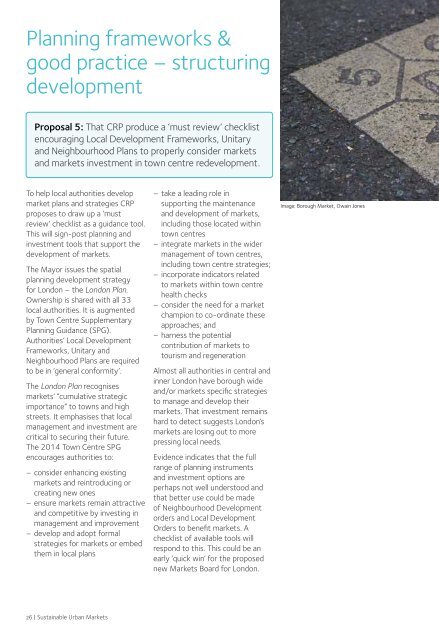Sustainable Urban Markets
Sustainable-Urban-Markets-An-Action-Plan-for-London3
Sustainable-Urban-Markets-An-Action-Plan-for-London3
Create successful ePaper yourself
Turn your PDF publications into a flip-book with our unique Google optimized e-Paper software.
Planning frameworks &<br />
good practice – structuring<br />
development<br />
Proposal 5: That CRP produce a ‘must review’ checklist<br />
encouraging Local Development Frameworks, Unitary<br />
and Neighbourhood Plans to properly consider markets<br />
and markets investment in town centre redevelopment.<br />
To help local authorities develop<br />
market plans and strategies CRP<br />
proposes to draw up a ‘must<br />
review’ checklist as a guidance tool.<br />
This will sign-post planning and<br />
investment tools that support the<br />
development of markets.<br />
The Mayor issues the spatial<br />
planning development strategy<br />
for London – the London Plan.<br />
Ownership is shared with all 33<br />
local authorities. It is augmented<br />
by Town Centre Supplementary<br />
Planning Guidance (SPG).<br />
Authorities’ Local Development<br />
Frameworks, Unitary and<br />
Neighbourhood Plans are required<br />
to be in ‘general conformity’.<br />
The London Plan recognises<br />
markets’ “cumulative strategic<br />
importance” to towns and high<br />
streets. It emphasises that local<br />
management and investment are<br />
critical to securing their future.<br />
The 2014 Town Centre SPG<br />
encourages authorities to:<br />
−−<br />
consider enhancing existing<br />
markets and reintroducing or<br />
creating new ones<br />
−−<br />
ensure markets remain attractive<br />
and competitive by investing in<br />
management and improvement<br />
−−<br />
develop and adopt formal<br />
strategies for markets or embed<br />
them in local plans<br />
−−<br />
take a leading role in<br />
supporting the maintenance<br />
and development of markets,<br />
including those located within<br />
town centres<br />
−−<br />
integrate markets in the wider<br />
management of town centres,<br />
including town centre strategies;<br />
−−<br />
incorporate indicators related<br />
to markets within town centre<br />
health checks<br />
−−<br />
consider the need for a market<br />
champion to co-ordinate these<br />
approaches; and<br />
−−<br />
harness the potential<br />
contribution of markets to<br />
tourism and regeneration<br />
Almost all authorities in central and<br />
inner London have borough wide<br />
and/or markets specific strategies<br />
to manage and develop their<br />
markets. That investment remains<br />
hard to detect suggests London’s<br />
markets are losing out to more<br />
pressing local needs.<br />
Evidence indicates that the full<br />
range of planning instruments<br />
and investment options are<br />
perhaps not well understood and<br />
that better use could be made<br />
of Neighbourhood Development<br />
orders and Local Development<br />
Orders to benefit markets. A<br />
checklist of available tools will<br />
respond to this. This could be an<br />
early ‘quick win’ for the proposed<br />
new <strong>Markets</strong> Board for London.<br />
Image: Borough Market, Owain Jones<br />
Measuring Value – knowing<br />
the unknowns<br />
Proposal 6: That London Councils work with its<br />
members, private operators and representatives<br />
bodies to:<br />
a) agree a set of economic and social ‘value measures’<br />
for markets and a mechanism for biennial collation;<br />
and<br />
b) that the GLA undertake to produce a biennial report<br />
on its analysis to inform strategic policy and planning<br />
In an information age it has become<br />
a truism that ‘what you can’t<br />
measure you can’t manage’. For<br />
markets it is tempting to add the<br />
rider, ‘so why invest?!’ This is the<br />
lacuna that London’s markets are in.<br />
Decision makers sense economic<br />
and social value, but need hard,<br />
resonant bottom-line figures to<br />
justify investment.<br />
Few refute the intrinsic value of<br />
London’s markets. They provide low<br />
cost self-employment, generate<br />
footfall for retail, provide access<br />
to cheap, healthy fresh produce,<br />
support cohesion and imbue places<br />
with identity. The Mayor considers<br />
them ‘a wonderful part of London<br />
life. [Bringing] great benefits to<br />
local communities and people on<br />
low pay.’<br />
DCLG, Nabma, the New Economics<br />
Foundation, Joseph Rowntree<br />
Trust, London Development<br />
Agency and others have all ascribed<br />
the economic, social, health,<br />
environmental and placed based<br />
value of markets. Still, harder more<br />
resonant metrics are required.<br />
Operators do capture trading days,<br />
pitches let, number of traders, etc.<br />
Turnover, profit, direct and indirect<br />
jobs supported and GVA are harder<br />
to pinpoint. Traders and managers<br />
remain some distance from<br />
employing the data capture and<br />
analytics that high street chains<br />
rely on.<br />
To address this and support<br />
management and investment<br />
decisions markets should adopt<br />
mobile licensing and management<br />
platforms like MACCS II and<br />
chip-and-pin payment devices to<br />
generate, store and analyse data.<br />
A London-wide Traders’ Card (see<br />
proposal 19 on page 51) would<br />
complement these innovation.<br />
In the meantime, a universal set<br />
of ‘value measures’ would help<br />
start to bridge the knowledge gap.<br />
This should capture the social and<br />
GVA of markets, too. The Quirk<br />
review and the ‘public value’,<br />
approach of Harvard Professor<br />
Mark Moore indicate viable<br />
approaches. The London Survey<br />
and work of social geographers like<br />
Danny Dorling have a contribution<br />
to make. An acuter understanding<br />
of value is needed.<br />
A biennial report produced by the<br />
GLA on behalf of a future <strong>Markets</strong><br />
Board for London would assist<br />
government, the Mayor, local<br />
authorities and the private sector<br />
to measure, manage, evidence and<br />
invest in London’s markets.<br />
26 | <strong>Sustainable</strong> <strong>Urban</strong> <strong>Markets</strong> Cross River Partnership | 27


